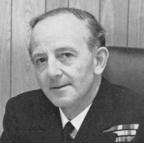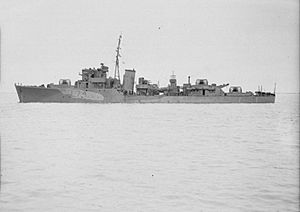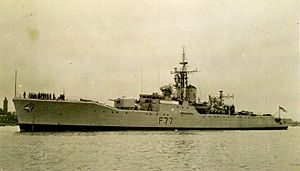Edward Ashmore facts for kids
Quick facts for kids
Sir Edward Ashmore
|
|
|---|---|

Sir Edward Ashmore
|
|
| Born | 11 December 1919 Queenstown, Ireland |
| Died | 28 April 2016 (aged 96) |
| Allegiance | United Kingdom |
| Service/ |
Royal Navy |
| Years of service | 1938–77 |
| Rank | Admiral of the Fleet |
| Commands held | Chief of the Defence Staff First Sea Lord Commander-in-Chief Fleet Western Fleet HMS Blackpool HMS Alert |
| Battles/wars | Second World War Cold War Third Cod War |
| Awards | Knight Grand Cross of the Order of the Bath Distinguished Service Cross Mentioned in Despatches |
Admiral of the Fleet Sir Edward Beckwith Ashmore was a very important officer in the Royal Navy. He was born on December 11, 1919, and passed away on April 28, 2016.
Sir Edward served actively in the Second World War. After the war, he commanded two ships called frigates. He then rose to become one of the highest-ranking officers in the Navy. In the mid-1970s, he was the First Sea Lord. This meant he was the professional head of the Royal Navy. He also advised the government on important defense plans. Later, he became the Chief of the Defence Staff. This is the top military role in the UK.
Contents
Edward Ashmore was born into a naval family. His father, Leslie Haliburton Ashmore, was also a Vice Admiral. Edward joined the Royal Navy as a cadet in September 1933. This was like starting military school.
He served on several ships early in his career. These included the cruiser HMS Frobisher and the battleship HMS Rodney. He became a sub-lieutenant in September 1939.
Service in World War II
Sir Edward Ashmore played an active role in the Second World War. He was posted to the destroyer HMS Jupiter in January 1940. He saw action during the Norwegian Campaign.
In 1941, he joined the destroyer HMS Middleton. He took part in the dangerous Arctic Convoys. These convoys delivered vital supplies to Russia. He also helped relieve Malta in June 1942. For his bravery, he received the Distinguished Service Cross.
In August 1942, he went to Russia. His mission was to help rescue survivors from a very difficult convoy, PQ 17. Later, he served in the Far East. He helped provide naval support during the Battle of Okinawa in April 1945. He even experienced a Kamikaze air attack. In September 1945, he witnessed the signing of the Japanese Instrument of Surrender. This event officially ended the war.
After the War
After the war, Ashmore learned to speak Russian. He worked at the British Embassy in Moscow in 1946. He continued to rise through the ranks. He commanded the frigate HMS Alert in June 1953.
He was promoted to captain in 1955. He later became the Captain of the 6th Frigate Squadron. He sailed in the frigate HMS Blackpool in October 1958.
High Command Roles
Sir Edward Ashmore held many important leadership positions. In 1963, he became Commander of British Forces in the Caribbean. He was also the Senior Naval Officer in the West Indies.
In 1965, he became Assistant Chief of Defence Staff (Signals). He was recognized for his service and made a Companion of the Order of the Bath in 1966. In 1967, he became Flag Officer Second in Command Far East Fleet. This role was based in Singapore.
He was promoted to vice admiral in 1968. He then became Vice Chief of the Naval Staff. In 1970, he reached the rank of full admiral. He was further honored as a Knight Commander of the Order of the Bath in 1971.
In September 1971, he became the last Commander-in-Chief Western Fleet. Soon after, the Far East Fleet and Western Fleet combined. He became the first Commander-in-Chief Fleet. He also held important NATO commands. In 1974, he was made a Knight Grand Cross of the Order of the Bath. This is a very high honor.
First Sea Lord and Chief of Defence Staff
On March 1, 1974, Ashmore became the First Sea Lord and Chief of Naval Staff. In this role, he advised the government on major defense plans. He also advised on the events of the Turkish invasion of Cyprus in July 1974.
He was promoted to Admiral of the Fleet in February 1977. This is the highest rank in the Royal Navy. He was then appointed Chief of the Defence Staff. He served in this top role for a short time before retiring in August 1977.
Later Life
After retiring from the Navy, Sir Edward Ashmore continued to be active. He became a director at Racal Electronics. He also served as a Governor of Suttons Hospital in London. He was Chairman of the Royal Navy Club of 1765 & 1785. Sir Edward Ashmore passed away in April 2016 at the age of 96.
Family Life
In 1942, he married Elizabeth Mary Doveton Sturdee. They had one son, Tom, and two daughters, Susan and Tamara.
 | Sharif Bey |
 | Hale Woodruff |
 | Richmond Barthé |
 | Purvis Young |



